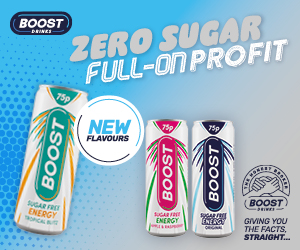A month on from the shock announcement that supermarket giant Tesco is to merge with Booker, the UK’s largest food wholesale operator, Scottish retailing stalwart David Sands considers the potential ramifications for independents and asks what the future could hold.
IT was with considerable surprise that I listened to the news of the merger of Booker with Tesco in a £3.7bn deal.

Over my many years in food retail I should know that “these things happen”. This is a major deal and will have profound implications for the food industry. I can well imagine the anger amongst many independent retailers who now face being supplied by their toughest competitor. Many suppliers will be realising that they face negotiating with an even bigger beast, with almost £60bn of buying power. Many business owners will be catching their breath and evaluating their options.
Bittersweet
It was, however, a bittersweet moment for me personally. I have long held shares in Booker, in fact they are my biggest holding by value. I should be happy that this holding is now worth much more. However, I sold all my Tesco shares last year, believing that their future prospects for the company were not entirely rosy. I now find that as well as receiving around 42p for each of my Booker shares I will own a bundle of Tesco shares!
I’ve long admired Charles Wilson and his team at Booker who have an excellent track record. If I’m honest I’m not sure I feel the same way about Tesco and its management team. One of the highlights of this deal is that Charles Wilson, with over 108m shares in Booker, will be unable to sell his new Tesco shares for five years. He will also be the number two at Tesco. That is very significant and a major coup for Tesco.
The merger has a certain irony as Charles Wilson and his team previously rescued Booker from a failed merger. Who recalls the Big Food Group, formed from a merger of Booker and Iceland. At the time there was a lot of talk about synergies (as is ever the case) but the differing corporate cultures resulted in failure. Interestingly, both Booker and Iceland have prospered subsequently operating independently.
Much research indicates that most mergers and acquisitions don’t deliver the promised value, and a key reason for this is often a clash of cultures. I am almost certain that the culture at Tesco will be radically different to that at Booker. I am also wary of claims made about cost savings, which here we are told will amount to around £200m.
I doubt there will be many savings in the Booker business, but perhaps Tesco might find itself being challenged by its new directors to scrutinise their own costs. Suppliers should take note of the expected £95m of procurement cost savings expected.
Other wholesalers must be waking up to the threat of this new behemoth.
Fundamental questions
The deal will be a major challenge for the competition authorities in the UK. It could be argued that they have been supine in the past, but much of the independent sector operating in the convenience store market faces being supplied by their biggest competitor who – let’s not forget – operate their own stores under the Tesco Express and One Stop banners. This feels distinctly odd. Any review may throw up opportunities to acquire new outlets for some, should the authorities order store disposals. It may be a brand – the One Stop business, perhaps – will need to be sold to allow the transaction to proceed.
Good independent businesses will also be thinking about their future source of supply, and asking themselves some fundamental questions. Other wholesalers must be waking up to the threat of this new behemoth, but also to the prospect of winning over many disgruntled retailers who may be thinking of getting in touch.
A considerable advantage
One of the best conference speeches I ever heard was by Allan Leighton, at the time CEO of Asda. He was speaking to a room filled with smaller food retailers and suppliers.
He addressed the smaller businesses in the room and told us that we had a considerable advantage over bigger companies, that we should be able to adapt and take advantage of opportunities quickly. This was in stark contrast to bigger companies.
I have never forgotten that lesson. The Booker/Tesco merger will throw up lots of opportunities and threats to retailers and suppliers in the coming years and I would urge all affected to think carefully about what this will mean for their businesses.














